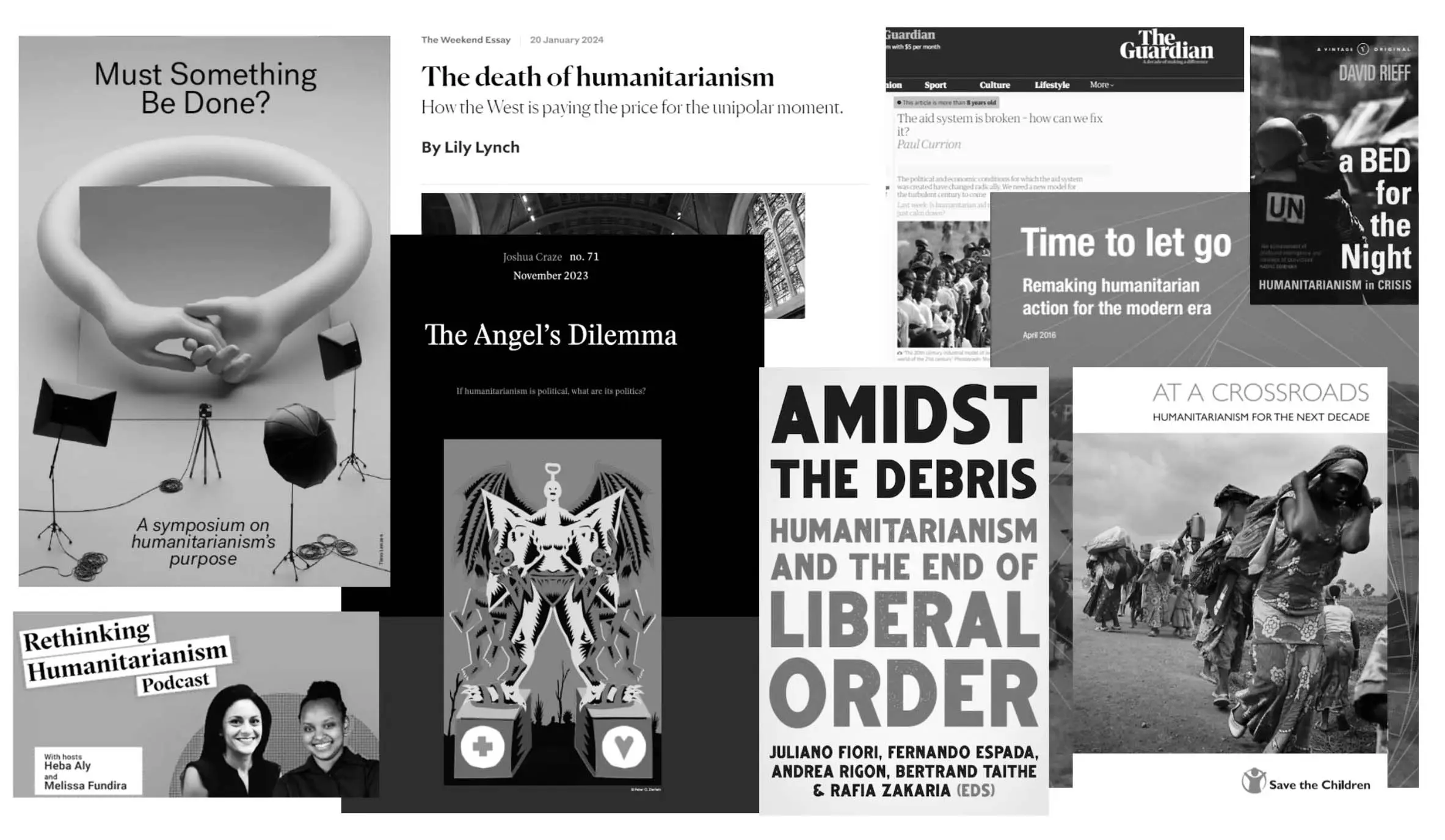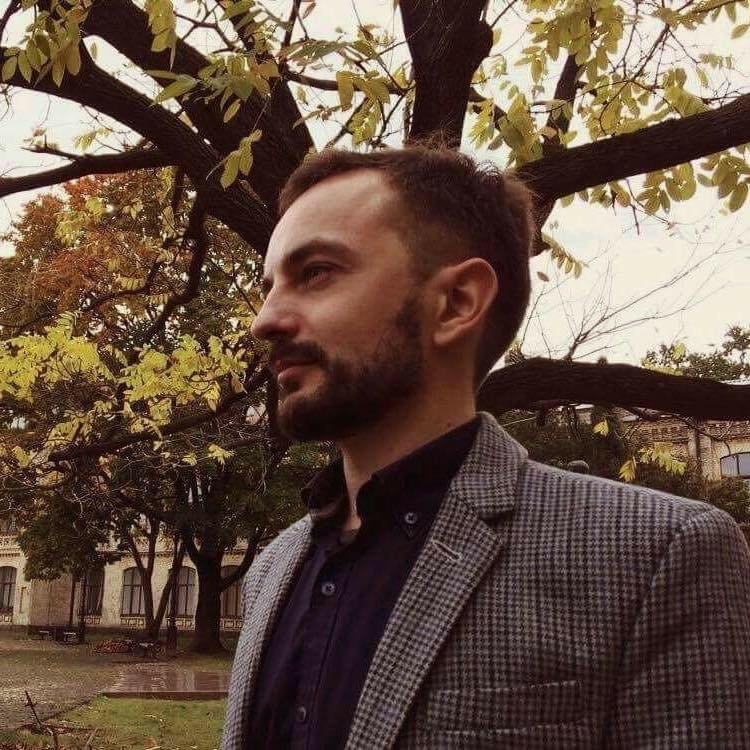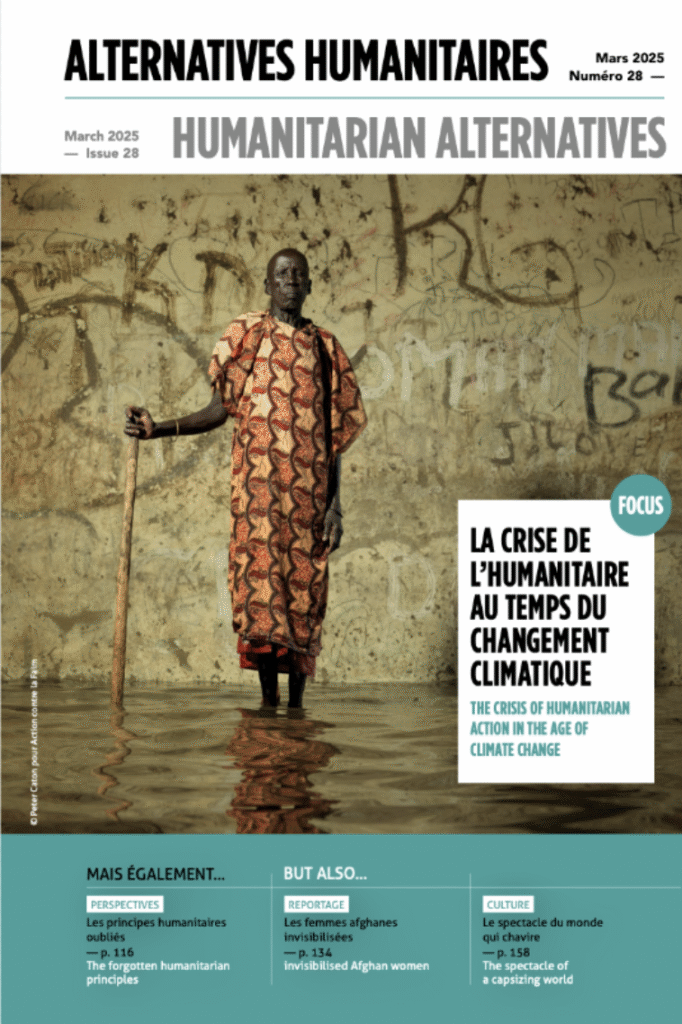PROJETO DE PESQUISA
Os limites do humanitarismo
Política, crise e reforma na era da mudança climática
Eleanor Davey e Fernando Espada

O projeto de pesquisa " Os limites do humanitarismo: Política, crise e reforma na era da mudança climáticas", liderado por Eleanor Davey e Fernando Espada, examina o encontro do sistema humanitário com as mudanças climáticas. Combinando abordagens históricas e de economia política, o projeto parte de perspectivas morais, técnicas e baseadas no mercado para explorar as complexidades da reforma no sistema humanitário. Estruturado em torno de dois temas, "contenção da política" e "governança da crise", a pesquisa incorpora workshops, apresentações e atividades on-line, com o objetivo de publicar uma série de textos para diferentes públicos. O projeto será executado entre novembro de 2023 a maio de 2025, e pretende se envolver criticamente com abordagens alternativas que os agentes humanitários poderiam considerar diante das mudanças climáticas.
ABORDAGEM DA PESQUISA
O projeto adota uma abordagem diferenciada para a reforma do setor humanitário, com o objetivo de desnaturalizar e criticar algumas de suas dinâmicas subjacentes. A pesquisa busca fornecer uma agenda compartilhada para aqueles que estão dentro e fora do sistema humanitário, abordando críticas fundamentais em meio às incertezas impostas pelas mudanças climáticas. O foco nos temas "contenção da política" e "governança da crise" esclarece os limites que o sistema humanitário está encontrando ao definir sua abordagem à crise climática e suas implicações mais amplas.
Contenção da política
- Dinâmica política e mudanças históricas: Explora a política nos processos de diagnóstico que moldam a reforma humanitária, desde a década de 1970 até o presente, considerando a instabilidade ecológica e as mudanças no engajamento internacionalista.
- Pautas na Reforma Investiga a definição da agenda durante a reforma, concentrando-se em como isso molda os compromissos humanitários e o papel das diferentes atitudes em relação à política.
- Impacto do mundo natural na resposta às mudanças climáticas: Examina o lugar do mundo natural nas abordagens humanitárias, avaliando sua influência nas respostas às mudanças climáticas.
- Funções e limites políticos: Explora como os atores que cruzam as fronteiras políticas afetam as atitudes políticas dentro do sistema humanitário, estudando os casos de maior envolvimento político e as reações que eles provocam.
- Rastreamento de padrões para caminhos alternativos: Analisa os padrões de contenção da política, com base em diversas experiências para entender a dinâmica de poder dos atores dominantes, oferecendo percepções para caminhos alternativos atualmente.
Governança da crise
- Ordem Liberal: Analisa como a ordem liberal enquadra as definições de crise, influenciando a compreensão, a legitimidade e as estratégias de resposta das organizações humanitárias, no contexto do impacto da mudança climática sobre a ordem liberal internacional.
- Natureza Social e Política da Crise: Examina a natureza social e politicamente construída da crise, evitando abordagens tecnocráticas e seu esgotamento semântico, transformando as crises em estados permanentes que exigem gerenciamento.
- O Papel do Mundo na Resposta a Crises: Reconhece o papel central do mundo natural nos sistemas de vida humana durante as crises, explorando como sua interdependência é integrada ou marginalizada na defesa da vida por vários atores dentro e fora do sistema humanitário formal.
- Perspectivas futuras sobre a crise: Interroga o significado e a aplicação da crise em meio à intensificação da mudança climática, afastando-se da ordem liberal em direção a entendimentos e abordagens alternativos.
- Design de pesquisa e implicações práticas: Situa os enquadramentos retóricos da crise humanitária em debates teóricos e políticos mais amplos, conectando a análise às práticas de resposta e gerenciamento de crises.
Contexto Operacional:
O conflito na Ukrania
pesquisadoras

ELEANOR DAVEY
Eleanor Davey escreve sobre histórias de ajuda e ativismo e como as perspectivas históricas podem informar os entendimentos atuais. Seu livro Idealism beyond Borders (Idealismo além das fronteiras) examinou como as ideias sobre a responsabilidade pelo sofrimento dos outros moldaram os compromissos políticos e humanitários na França, incluindo a criação da Médicos Sem Fronteiras. Ela publicou sobre dinâmicas de poder e debates dentro e entre organizações humanitárias e seus interlocutores, incluindo histórias do direito humanitário internacional e outros conceitos de intervenção, engajamentos humanitários com grupos armados anticoloniais e ajuda em situações de deslocamento e confinamento. Além de sua própria pesquisa, ela apoiou uma ampla gama de projetos de pesquisa acadêmicos e voltados para a prática, por meio de várias funções no Overseas Development Institute (Londres), no Humanitarian and Conflict Response Institute (Universidade de Manchester) e no Humanitarian Advisory Group (Melbourne).

FERNANDO ESPADA
Fernando Espada é Diretor de Assuntos Humanitários da Save the Children. Ele ingressou na Save the Children em 2014, depois de ter trabalhado como Pesquisador Sênior e Associado de Políticas na DARA, Gerente de Pesquisa de Campo do Humanitarian Response Index e Diretor Adjunto do think tank FRIDE, entre outros. Fernando é membro do conselho editorial do Journal of Humanitarian Affairs, coeditor de Amidst the Debris: Humanitarianism and the End of Liberal Order (Em meio aos destroços: o humanitarismo e o fim da ordem liberal), editor de artigos sobre humanitarismo e ensaios sobre política humanitária. Ele já conduziu pesquisas de campo e análises de políticas em diversos de respostas humanitárias.

Nina Potarska
Nina Potarska is a gender expert on peacebuilding and conflict resolution. She has experience managing NGOs and research projects, as well as in research and analysis. Since 2016, she has been the national coordinator of the International Women's League for Peace and Freedom in Ukraine. The program's goals are to increase women's participation and ensure that gender aspects are taken into account in national and international structures. The main focus is on identifying human rights violations based on gender analysis. As part of her activities, she monitors the needs and observance of the rights of women living near the contact line, gender-based violence and conflict-related violence, gender-inclusive mediation in conflicts, and prepares reports on the observance of women's rights in the UN system. Since 2013, she has been the director of the Center for Social and Labor Research, and since 2015, she has been researching topics related to the war in Ukraine. She collects narratives and conducts research on both sides of the contact line.

Andrii Bahinskyi
Andrii Bahinskyi is associate professor at Igor Sikorsky KPI Sociology Department (Kyiv, Ukraine) and coordinator of the master's program "Conflict Resolution and Mediation". As part of the project supported by the embassies of Great Britain and Switzerland in Ukraine, he is one of the developers of the first master's program in Ukraine, which trains specialists in the field of resolution of socio-political conflicts. Dr. Bahinskyi explores liberal peacebuilding from a global perspective. His research focuses on finding strategic solutions to resolve armed conflicts. His analysis is also devoted to issues of interaction between civil society and the state during war. Special attention of his research is paid to civil society organizations that support vulnerable social groups in Ukraine. His latest research projects and publications consider the humanitarian, social and political consequences of the Russia-Ukraine war.
RECENTES
DOSSIÊ
This dossier brings together a diverse and incisive group of thinkers to interrogate the humanitarian system’s enduring paradox: its claim to neutrality versus its deeply political reality. Framed by Eleanor Davey’s introduction, the collection revisits key moments of reform from the 1970s to the 1990s, showing how political choices are often disguised as technical adjustments that insulate dominant power structures. Contributors such as Mark Duffield, Rahmane Idrissa, and Mandisa Mbali expose how humanitarianism has shifted from saving lives to regulating death, misunderstood grassroots movements, and masked racialised violence. Čarna Brković and collaborators reveal how Yugoslavia’s non-aligned interventions challenged Western humanitarian orthodoxy, while Pamela McElwee and Jan Eliasson interrogate the evolution of environmental and normative frameworks.
WEBINAR
- 24th April 2025
- 4pm (GMT)
- Online
As the project came to a close, we hosted a webinar on 24 April 2025 to reflect on how the sector is navigating a moment of profound uncertainty. Speakers Andrii Bahinskyi, Eleanor Davey, Fernando Espada, and Nina Potarska shared insights from the project, which has brought together a diverse group of authors and contributors. The conversation drew on the themes explored across the project’s essays and reports, which remain available on the project website.
ЗВІТ
Війна в Україні спричинила глибоку гуманітарну та екологічну кризу, оголивши глибокий взаємозв’язок між збройним конфліктом, руйнуванням довкілля та глобальною продовольчою безпекою. У своєму останньому звіті Андрій Багінський та Ніна Потарська аналізують, як спричинені війною викиди CO₂, руйнування екосистем та порушення критично важливого сільськогосподарського виробництва створили нові фактори вразливості, що впливають на мільйони людей в Україні та за її межами. Дослідження також критикує жорсткі структури міжнародної гуманітарної допомоги, яка часто надходить із готовими рішеннями, що не можуть бути адаптовані до реалій на місцях.
Relatório
Ucrânia: guerra, mudança climática e as limitações do sistema humanitário
A guerra na Ucrânia desencadeou uma profunda crise humanitária e ambiental, expondo as profundas interconexões entre conflitos armados, destruição ecológica e insegurança alimentar global. Em seu último relatório, Andrii Bahinskyi e Nina Potarska analisam como as emissões de CO₂ induzidas pela guerra, a devastação do ecossistema e a interrupção da produção agrícola crítica criaram novas vulnerabilidades, afetando milhões de pessoas dentro e fora das fronteiras da Ucrânia. O estudo também critica as estruturas rígidas da ajuda humanitária internacional, que muitas vezes chegam com soluções pré-embaladas que não se adaptam às realidades locais.
Relatório
Uma reflexão crítica sobre a reforma humanitária - passado, presente e futuro
The report led by Eleanor Davey captures vital insights from a workshop that brought together humanitarian reformers, scholars, and sector leaders to dissect the evolving landscape of reform. With an eye toward the complex interplay between climate change, geopolitics, and structural limitations, it offers a nuanced examination of the barriers that persist within humanitarian practices. The report traces the roots of today’s reform efforts, questioning whether entrenched structures can adapt to a world of increasing crises and identifying areas where systemic constraints and organisational inertia often thwart meaningful change.
WORKSHOP
Ukraine: war, climate change and limitations of humanitarian system
- 4th July
- 1pm (GMT)
- Kyiv and Online
The workshop was led by Nina Potarska and Andrii Bahinskyi, and aimed to look at the Russian-Ukrainian war in the context of climate change and the limitations of the humanitarian system in responding to military action. The event brought together representatives of Ukrainian civil society, international organizations operating in Ukraine, environmental and social experts, and representatives of the academic community.
WORKSHOP - PART II
HUMANITARIAN REFORM
- 3rd July
- 17:30h (GMT)
- Evento Online
This was the second part of the critical reflection on humanitarian reform. The first session (“the will”) explored claims related to the willingness to undertake called-for reforms, focusing on the influence of geopolitics and vested interests. The second session (“the way”) considered claims related to the ways forward, looking first at the available bandwidth for reform and then at the current ability to imagine alternatives as the system confronts the climate crisis.
ESSAY
Quando o mundo da emergência encontrou a crise climática is the latest publication of Eleanor Davey and Fernando Espada. The essay discusses the ineffectiveness and inequalities in the global response to crises, focusing on the COVID-19 pandemic, the Russian invasion of Ukraine, and the Gaza conflict. The authors analyse the colonialism inherent in the humanitarian system, the failure to enact substantial reforms, and how this transformation is taking place in relation to the climate crisis.
* The views expressed in the article are those of the authors and do not necessarily reflect the positions of Save the Children or any other organisation.
WORKSHOP - PART I
HUMANITARIAN REFORM
- 19 de Junho
- 17:30h (GMT)
- Evento Online
The workshop led by Eleanor Davey and Fernando Espada aims to create a space for critical reflection on current humanitarian reform, by bringing together people currently involved in reform initiatives, leaders of past reform efforts, and scholars of humanitarianism and international affairs. The objectives of the discussions are to: i. contribute to sectoral memory and learning about humanitarian reform; ii. inform approaches to current reform strategies and/or initiatives; and iii. identify potential avenues for research on the past and present of humanitarian reform.
FELLOW TALKS
- 8 de Fevereiro de 2024
- 10:30h (Horário Britânico)
- Evento Online
Eleanor Davey e Fernando Espada apresentam o projeto de pesquisa financiado pela Alameda sobre as práticas, os limites, a história e as perspectivas de reforma do sistema humanitário na era das mudanças climáticas. Durante a sessão, os co-líderes do projeto refletem sobre os principais temas do projeto (contendo política e ordenando a crise) e a relevância dessa pesquisa para repensar as respostas coletivas aos desafios de nosso tempo.

